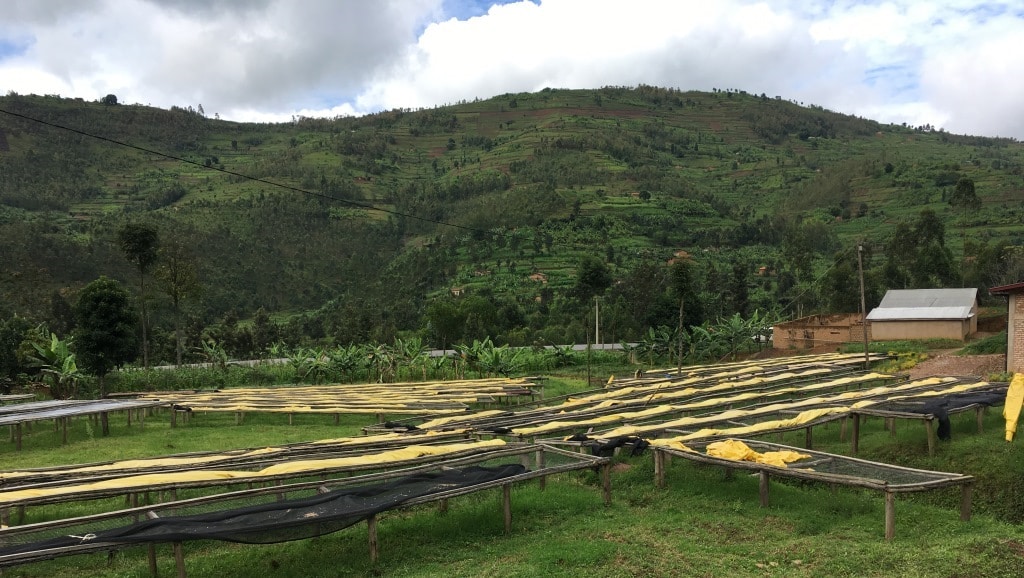The potato defect affects coffees from Rwanda, Burundi, and D.R. Congo. It is called “potato” because it creates an obvious and overwhelming potato smell when the roasted coffee is ground. In an effort to add transparency to what we do, we established a policy around identifying and crediting bags of coffee with this defect. As a result, we can continue to promote the phenomenal coffees of this region. Such a policy likely raises some important questions! Here’s an ever-updated FAQ to help you understand and navigate these problems:
Why would you offer a defective coffee?
This is really the most important question, and we want to answer it honestly. Coffees from Rwanda, Burundi, and D.R. Congo are often astonishingly good. Without the presence of defect in a cup, many we source are easily 86-points and above. We heavily vet coffees from these regions to find lots that have few occurrences of potato. Second, the coffee industry is booming. Coffee is a crucial part of the developing economies of these countries. All three experienced decades of economic and violent strife. The communities we are working with produce specialty coffee because it is a sustainable pursuit. Third, there is no cause identified for the potato defect.
We link to a number of articles at the end of this post. Please notice the inconsistency among them. At present, work is being done to eliminate the issue, but we haven’t yet found a method. Turning our back on these communities and coffees seems pretentious, unsustainable, and anti-specialty.
We’ve fallen in love with these coffees just because of their amazing qualities. To add to that, we are now becoming more invested in the mutual success of our relationships in Rwanda. Our importing partner for Agasaro and Ejo Heza, Artisan Coffee Imports, addresses the potato problem honestly. They monitor for the issue and help offset the costs of coffee that must be discarded. This helped and encouraged us to create this policy. In addition, Blueprint and Artisan pay a premium to the growers for “sinker cherry,” which are coffee cherries with enough density to sink in a pool of water. Not only is sinker cherry less likely to have potato defect, it also is likely to taste better, and the sinker/floater testing creates an additional washing step in processing. A triple win! Mutually beneficial partnerships mean succeeding and struggling together. We invite you to become an advocate for these fine coffees. We believe awareness and transparency lead to the eventual identification, and possible eradication, of the cause(s) of potato defect.
How will I know if my coffee contains potato defect?
You’ll know as soon as you grind the coffee. The smell from the defect creates an instant and strong smell of raw potatoes. Conveniently, it’s easy to identify the defect once the coffee is ground. The frustrating part is that it’s impossible (so far) to identify it in the coffee beans before they are ground. If you smell the defect, we recommend discarding the grounds immediately in a separate room or sealed container. The presence of the smell will make it difficult to identify the flaw in the next set of beans you grind. This is especially relevant in a coffee bar or restaurant scenario.
What should I do if I get a potato defect in my bag of coffee?
12oz Bags (local): Simply return the 12oz. bag to our Delmar or Watson location (6225 Delmar or 4206 Watson), no matter where you bought it. Subsequently, we’ll replace the bag with a new bag of the same coffee or another bag of your choosing.
12oz Bags & 2# Bags (online orders or out of town): Send an email to (orders at blueprintcoffee dot com) that identifies the roast date and batch number (on the bottom of the label). Indicate if you would like a replacement of the same coffee or a different coffee. Also, please indicate the shipping address we should send it to. After that, we will send that replacement to you along with a return label and envelope with which we ask you return the defective coffee.
2# bags & 5# bags (wholesale partners): We ask that our wholesale partners educate themselves and their staff using this post and the links below. We strongly suggest padding the margin on cups of coffee from these regions by adding an additional 3-7% to the sales price. Therefore, you can comfortably discard any defective coffee ground in your store and absorb that cost. Consider offering these coffees in small-batch style brewing (pour-over or espresso). As a result, identifying the defect without grinding through a large amount of coffee is possible. If you are retailing bags of our coffee, a sticker guiding your customers to this blog post will be on the back of the bag. They can use the local or out of town instructions to receive credit if they get a defective bag.
Why should I take the risk on these coffees when you have others to offer?
Again, these coffees are astonishingly good and unique. If you are a fan of lively and sweet coffees from further north in Africa (Kenya, Ethiopia), we believe you’ll find a kinship in these coffees during the off-season for northern Africa. Plus, purchasing these coffees creates an active participation in the betterment of the communities that grow them. Additionally, the cooperatives, exporters, and importers who fund research into the defect are encouraged to keep trying.
What causes the potato defect? Will it hurt me?
So far, we have found research into the causes of potato is inconclusive. Below, find a number of articles about it. In our experience, and the experience of our peers in the coffee industry, the defect has no known detriment to human health.
Links to other potato defect articles
Daily Coffee News: “Potato Taste Defect: What Roasters Need to Know” by Chris Kornman
https://dailycoffeenews.com/2017/12/20/potato-taste-defect-what-roasters-need-to-know/
SCA Coffee News: “Risk, Responsibility, and Potatoes? A Rwandan Coffee Story”
https://scanews.coffee/2014/07/07/risk-responsibility-and-potatoes-a-rwandan-coffee-story/
Intelligentsia Coffee: “What to do about Mr. Potato” by Geoff Watts
https://blog.intelligentsiacoffee.com/2016/12/23/what-to-do-about-mr-potato/
Agriculture, Ecosystems & Environtment: “Occurrence of potato taste defect in coffee and its relations with management practices in Rwanda” by Joseph Bigirimana, Christopher G. Adams [et. al]
https://www.sciencedirect.com/science/article/pii/S0167880918304031

